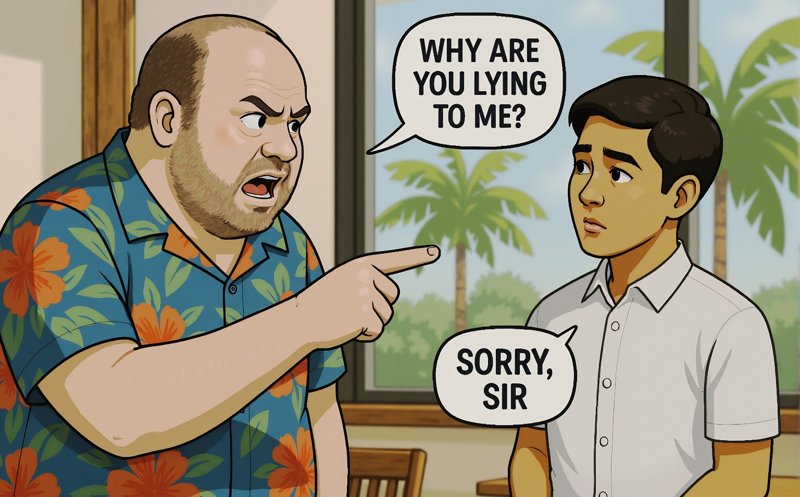I recently read a post in Philippines Expats by an American living in Manila. He had left his headphones at a restaurant and returned shortly afterward to ask if they had been found. A polite young employee told him, “Sorry, sir, we already looked—we don’t have them.” The American was confused. How could they have already looked when no one had reported them missing yet?
He reacted directly: “Why are you lying to me?” The young man repeatedly replied, “Sorry, sir,” without offering any explanation. The expat grew frustrated and wondered if lying is second nature in the Philippines, and that something is deeply wrong with the culture.
This reaction is understandable but reveals a lack of understanding of Filipino culture. In Western societies, we are raised to value honesty as a fundamental form of respect. A lie, even a small one, feels like a violation of trust. But many foreigners don’t realize that the social rules guiding communication are very different in the Philippines. What we interpret as dishonesty may be something else entirely.
In the West, we live in what anthropologists call a guilt-innocence culture. Truth and justice are seen as absolute values, and individuals are expected to speak honestly regardless of the consequences. Saying “I don’t know” is considered honest and even respectable.
The Philippines, however, is shaped by an honor-shame culture. In this context, avoiding shame and preserving harmony are often more important than giving a strictly factual answer. Admitting ignorance or fault can feel humiliating—not just for the individual, but for the group they represent. Saying something vague or even inaccurate is often a way to protect dignity and preserve peace.
That’s likely why the employee responded the way he did. He wasn’t trying to deceive anyone but to avoid embarrassment, both his and the customer’s. His repeated apologies weren’t avoidance; they were the only socially acceptable response.
The real problem arises when we confront such situations directly. In Western cultures, it’s normal—sometimes even expected—to challenge what we perceive as false. But in the Filipino context, that kind of directness can feel aggressive and disrespectful. It doesn’t solve the issue; it deepens the discomfort.
Instead of reacting with accusations, we can try a different approach. Asking again, kindly and without pressure—“Could you please double-check, just to be sure?”—is often more effective than pressing someone into a corner. Even if we suspect the first answer isn’t accurate, we must recognize that the words come from a different emotional and cultural framework.
Living in a new culture means encountering minor misunderstandings that carry big emotions. But it also allows us to grow beyond our habits. In another culture, what we call lying may be an expression of respect, modesty, or a way to avoid shame.
Truth has many faces. If we want to understand each other, sometimes the best thing we can do is listen for the meaning behind the words, not just the words themselves.
Learning this distinction can make all the difference for expats in the Philippines between daily frustration and genuine connection.
Featured image © Eldar Einarson. This image illustrates similar situations, intended to highlight a recurring issue that manifests in various ways. It is not necessarily fully representative of the specific situation the article is based on.







4 responses to “Lies or Cultural Misunderstandings? An Everyday Story from the Philippines”
Thank you. This is a great example of cross-cultural (mis)communications. I have been coming in and out of the Philippines for more than 34 years and am (still) married to a lovely Filipina/Cebuana more than 27 years, and still fall into these cross-culture traps 🙂
So who is right and who is wrong? I think both sides are right and wrong, culturally speaking.
For me, there also is also another dimension to this. We should always try to understand the other culture, and our own culture, and appreciate that every culture is flawed and that every cultural set of lenses is colored.
We are not to judge others and we are also not to tell lies/hide truths. When we are not honest in a loving and relationship-preserving way then community will suffer, social fabric will fall apart, and mistrust and distrust will develop. And that is neither good nor right.
So aim to preserve the relationship by communicating in a loving way that exposes lies. Not easy, but not impossible.
Thank you for this thoughtful comment. You describe the heart of the issue perfectly: cross-cultural communication is rarely about one side being right or wrong, but about two different worlds trying to meet with good intentions.
I fully agree that both understanding and honesty are needed. When we try to see the “color of our own lenses,” as you say, the misunderstandings become easier to navigate. And yes, honesty delivered with care is what keeps relationships strong, whether in the Philippines or anywhere else.
Thank you for sharing more than three decades of experience. It adds depth to the conversation and reminds us that learning never really stops.
Awesome insight. thanks for sharing!
Thanks, looking forward to seeing you in Davao 🙂